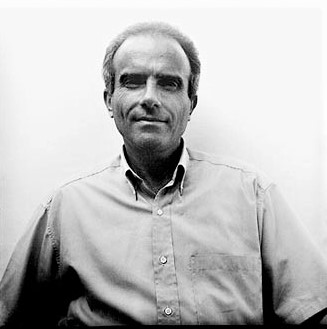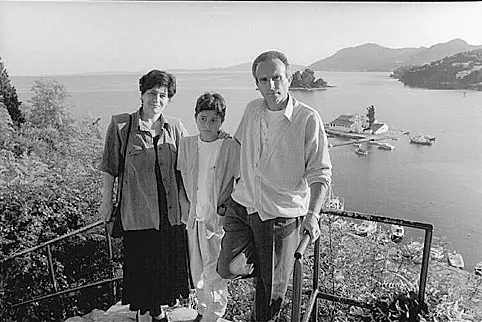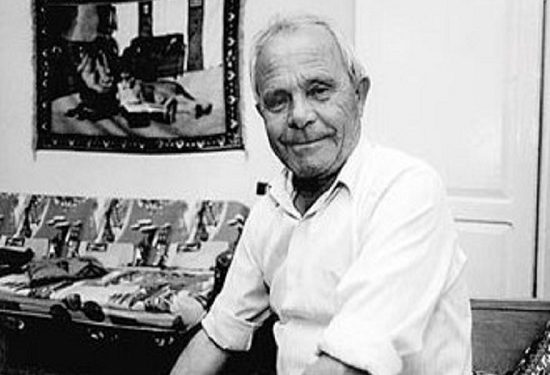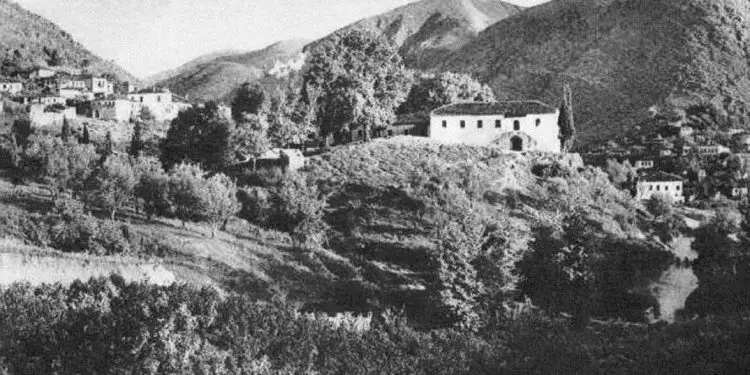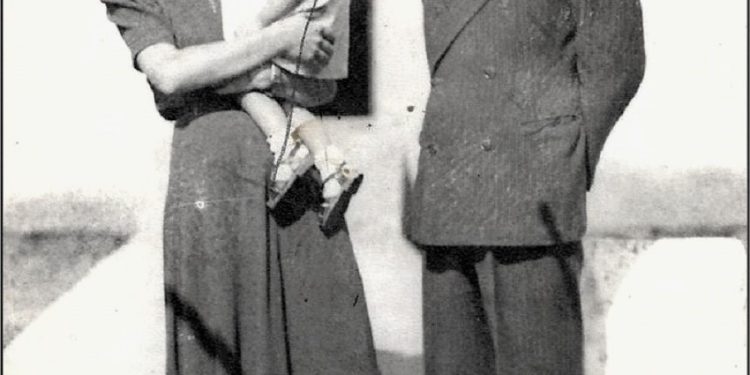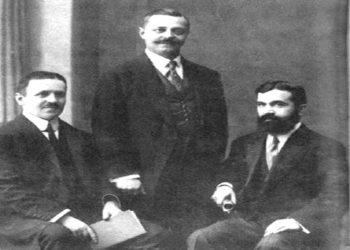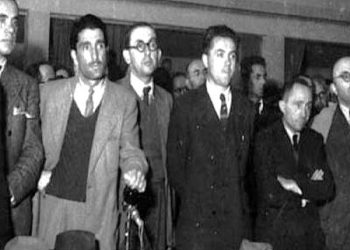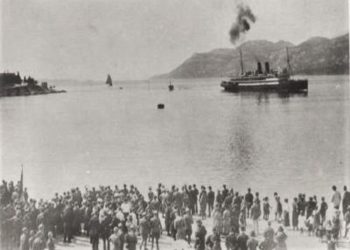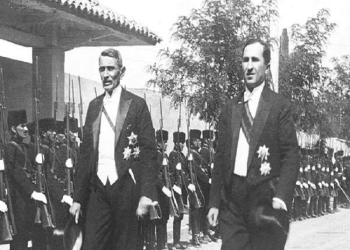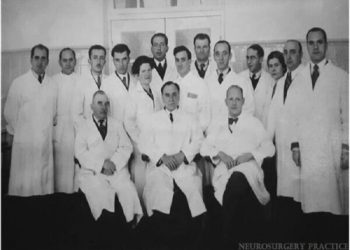From Thanas Gjika
Part four
– Portrait-biography, dedicated to Dino Thanas Martikos-
Memorie.al / During the national history of the Albanian people, many men and women have stood out for the courage with which they opposed the injustices and unjust orders of foreign or local rulers. This phenomenon has been widespread for centuries, but also during the years 1944-1991, when the communist dictatorship ruled. However, the terror policy and propaganda of the party-state forced the people to value servility towards the party and power as bravery. The courageous stances of those who opposed the Party’s policy, or the wrong actions of the Party cadres and the government, were punished with imprisonment, exile, shootings, etc.
Continues from last issue
The second arrest and imprisonment, the extinction of Dino…!
After his son’s engagement, Dinua felt very satisfied and often among his friends, he said the expression of his grandfather Mitro: “If I die now, I would be the happiest man in the world.” But Robert’s engagement, for State Security, was an event that had to be hit. His father-in-law, the pensioner Vllasi Jorgji, as an old communist that he was, should not have quarreled with the class enemy. Vllasi was smart and brave, very similar to Dino in character. How they say the word: It looks like a affinity without being made. He did not interfere with the girl and the engagement was done for beauty. On June 1, 1979, at the Congress of the Democratic Front, dictator Hoxha once again forcefully announced: “War on the internal enemy”.
For the vice president of the Vlora branch, the infamous Muhamet Hila, a lowly Vlonjat, these words had the meaning of punishing former prisoners for the second time. Dinua was a man of the square, an old resident of Vlora since 1948, who, despite his previous conviction, enjoyed respect. He had never been interested in who became Branch Chief, Chief of Police, Prosecutor, etc., and never sought their friendship. He also felt disgust towards the servile pensioners and spies, which was understood by his distance from them. This behavior of Dino had already angered the chief Muhamet Hila. The coffee that pensioner Dino drank at the Hotel Turizmi in Vlora, for the vice president of the Branch, was an unbearable mess. Stories from the time of the war and after it were also told about the courage of this former prisoner…!
Chief Hila had been working for Dino’s arrest for a long time, but he needed a reason. And here is the word of the leader of the Party; it was a very good occasion. After two days, on June 3, 1979, he managed to make the second arrest of Dino, now a 65-year-old pensioner. Krushku, Vllasi, to show Sofia and Roberti, that he did not change his mind about the engagement, said: “I would not come to Dega, get permission or ask who to betroth my daughter to”. The security knew that Dinua would not be an easy arrestee who could be easily subdued, so two months before his arrest, he was handcuffed by an ex-prisoner who, after serving 20 years in prison, was continuing to suffered exile in a village of Vlora. During the arrest and the first investigation he was not broken. But now after the second arrest, during the torture in the investigator, he could not resist. They asked him to accuse Dino, that the data of the farm where he worked was sent by Dino to Greece, and he accepted. In addition to this, Dino was brought to court by three other witnesses. Among them he recognized only one former lawyer, from Himara.
The trial took place in Vlora with closed doors, on February 4, 1980. Very few people were allowed to participate, of course the security and communists. Sofia and Roberti were left to sit in the corridor, where the accused would pass before entering the courtroom. “We had been waiting in the icy cold corridor for several hours. When the group with judges, witnesses, policemen, father and prosecutor appeared. Mother pointed to me at some distance, but I hardly recognized her. He was very weak”, says Robert and continues: “I didn’t understand where his soul was. But both my mother and I didn’t want him to understand our surprise at his appearance, so we stuck to our faces, one as a smile to show him that we were fine and not to worry about us.”
At the end of the process, Judge Reshat Polovina decided that Dinua should be sentenced to 23 years of imprisonment for treason and agitation and propaganda, even though the facts were missing and the accused had not admitted anything during the process to the investigator. (Robert, after 1992, when he saw the documents filled with false accusations of both trials, noticed that they were not signed by the convicted). Dino’s sentence of 23 years in prison without any real facts showed that State Security had decided to eliminate him forever. The investigators could not change the shape of his diamond character, nor crush it to use it as they wanted, so they threw him in prison for life, where they mistreated him and took his life prematurely. Thus State Security and the Party depleted Albania of the brave, to keep its people scared and subdued…!
Dino’s non-breaking during the second investigation should be appreciated more than his not breaking during the first investigation, because the second lasted not five and a half months, but nine months, when he was 65 years old and not 40 years old. This time, drugs were also used against him, to make him feel powerless, to surrender. However, they weakened his physical strength, but not his moral strength. He remained an example of a man who did not break until the end. Donika, Robert’s daughter-in-law, during the nine-month investigation of Dino, despite the great pressures that were placed on her, despite the strong psychological stress she experienced, did not separate from her fiance. A week after Dino’s conviction, the two were married. The authorities of Vlora “kept their word” when they told Donika and her father that, if she married the son of her class enemy, they would remove her from Vlora, where she worked as a doctor.
Indeed, after the marriage, Donika was removed from the City Ambulance and sent to work at the Akarnia Health Center, where Robert also worked. But the love between the two young people was healthy. Donika and Roberti willingly faced the difficulties of working away from the city. Very soon, Martiko’s new family was joined by two healthy sons, whose upbringing was taken care of by mother Sofia. The children’s suffering gave her joy, reducing her stress and boredom. As during her first imprisonment, she cared for her imprisoned husband with a rare devotion. Despite her old age, she traveled the long distance on foot from home to prison and vice versa to visit her husband two or three times a month.
Writer Robert Martiko described the scene of the last meeting with his father with these words: “It was the last days of my life. I could physically see that he was dying, but his gaze was calm and quite focused. The policeman who was present did not take his eyes off her. It was a great surprise to me the face with the above appearance. I noticed that for Dino Martiko in those moments, bars, policemen, dictatorship, tons of concrete prison did not exist. Although physically enslaved and one step away from death, I saw in his eyes a kind of spiritual freedom that only extraordinary souls are able to display. From later readings, I learned that such spiritual freedom was also experienced in prison by Pjeter Meshkalla and some class intellectuals”.
Dinua died in prison, inside the Tirana prison hospital in 1985, at the age of 71. They had brought him from the labor camp of the village of Zejmen in Lezha, in a serious state of health. He had suffered his first heart attack, in the prison of Ballshi, two or three months after he went through the heavy and torturous investigation in Vlora. The evening they had spent from Zejmeni in the prison hospital of Tirana, the doctor Meri Kriqi Gjinushi, the daughter of the doctor Lefter Kriqi, who voluntarily took the guard service that night, took care of him. But with all her care, she died near dawn. Two humane customs that our people respected for centuries were giving help to a person in difficulty and participating in the funeral ceremony of a deceased acquaintance. However, as Roberti told me, the neighbors and acquaintances of the Martiko family in Vlora during the dictatorship stayed away, they behaved with all the prisoners’ family members for agitation and propaganda, as if they had ‘cholera’.
To the shame of the Party and the Security, who terrorized the people, the custom of escorting the dead with a bad biography to the cemeteries was carried out with the participation of only family members, because the acquaintances were afraid that their biography would be ruined. The burial of former political convicts, even of the murdered Prime Minister Mehmet Shehu, was carried out a few years ago, with the participation in the burial process of only some of his family members. But towards Martikova, State Security proved to be even more criminal. He did not inform them of Dino’s death and did not give them the corpse to pay his last respects. The body of this dead man was buried by some Security employees. His son, Robert, after a year of searching, barely found his father’s burial place. Dino Martiko died at the age of 71, worn out by ill-treatment and was never remembered or appreciated during the communist regime, for which he gave his help during the War and after it. Even the democratic governments barely appreciated him in 2011 with the certificate: “Honorary Citizen of the Municipality of Lukova”, and after it in 2012 with the “Martyr of Democracy” medal, signed by President Bamir Topi.
Sofia, brave wife and mother patient to the point of legend
Many and great were the sufferings and manly endurance of Dino Martikua, but just as many and great were the sufferings and also had her endurance and the manly Sofie Gribizi Martiko, his wife. During her life in Albania, from the day she married and left her parents in Corfu in 1942 until she returned to her sick daughter’s parents in 1989, Sofia experienced only a few happy days and thousands of bitter days filled with suffering, poor and spiritual shock. In 1944, Sofia gave birth to her first daughter, Merin, who unfortunately, before turning two years old, fell ill with polymyelitis. It was 1946, when there was a shortage of medicines and medical services in Saranda. Dinua, begged some friends with high positions in Tirana, to give him permission to take the girl with her mother to Corfu, to cure her. The expenses would be removed by the girl’s grandfather and the mother would return soon. Six months passed without any positive response. One day, the problem of the permission to rescue the girl in Corfu was solved by the new head of the Saranda Branch, former War comrade, Nuri Luçi.
Nuriu was young and dynamic. When he found out that the girl’s illness was incurable in Albania, he said to Dino: “Why do you expect those from Tirana to finish work?” Tell the woman this afternoon, as soon as the sun sets, to be ready together with the girl to go to Corfu”. And so at sunset, the ship was launched and when it arrived in the vicinity of Corfu, the ship emitted several light signals and a small fishing boat with two Greek fishermen came near the Albanian ship. Sofia and the girl carefully jumped on the fishing boat and continued sailing to Corfu, while Dinua with Nuri and the driver returned to Saranda. It is worth adding that the Security officer, Nuri Luçi, after a few years was transformed into an officer completely subservient to the orders of the Party and his bosses and committed many crimes as Branch Chief, in different districts. Sofia with her daughter at dinner late reached her parents’ house. But the next day, before dawn, he was arrested by the Greek police.
It was a time when relations between Greece and Albania were strained. To the question of who brought her to Greece, Sofia answered simply that; he did not know the persons. She clarified whose daughter she was and that she had come to heal the girl. After three days, her father managed to secure her release. When Sofia learned that the girl’s recovery was difficult and would take a long time, she asked to return to Saranda, near her husband. He did not see the girl again until he was allowed to repatriate in 1989 together with Robert’s family. There were years, like in the years 1954-1957 and 1979-1985, during Dino’s first and second imprisonment, when Sofia stopped correspondence with her sick father, mother and daughter, in order not to give reason to the Albanian Security, to give other punishments. During those years, she did not receive any financial aid or clothing packages from Greece. In order to survive with her little son and to provide the food she had to feed Dino, during the first imprisonment, she provided income from a profession, which she started to create herself. For the first time in Vlora, she began to sew women’s socks and mend her loose eyes, with the help of a small primitive sewing machine, which she had given her as a dowry.
It is understood that her patience and persistence to cope with this tense life in Vlora have been extraordinary. In that city, she had no one from her tribe, not even a trusted friend, to mourn her troubles. One of her former colleagues proposed to her to separate from Dinua, in order to ensure the future of her son and herself. But in her mind, such a solution was unacceptable, even disgusting. She did not think of this solution even in 1946, when she was in Corfu with her daughter near her parents. Since ancient times, the girls of the Greek and Illyrian-Albanian tribes had received an education according to which the moral code was instilled in them that they were born and raised in their parents’ house, but they belonged eternally to the houses of men where fate led them. . This kind of moral code was also embedded in Sofia’s consciousness; therefore she could not leave her husband’s house, her destiny, even though her union with Dino was done with the goer and not with love. The love between them was born later, when they got to know each other in pleasant moments and in difficult moments.
Mother-in-law Sofi experienced great joy when she saw that her son’s daughter-in-law also followed this path of solution, without being forced by anyone, even at a time when she still had no children. It was this act of the bride that made Sofia’s love for her grow so much that many biological mothers did not love the daughters they had on their own. Such was Sofia, a woman without words, who never complained about the difficulties and misfortunes that fell on her head, but overcame them with patience and perseverance, thanks to her character, similar to the character of the Albanian mountain women. And God rewarded his perseverance by returning to Corfu, together with Robert’s renewed family. Sofia Gribizi Martiko, left her happy life, three years after she lived in Corfu near her parents and saw her son, daughter-in-law and two grandchildren, adjusted to the new life…!
In the free world there are many possibilities
The Berlin Wall had not fallen yet, but the successor of dictator Hoxha, Ramiz Alia, to show that he was tolerant and that he was moving towards liberalization, began to make some concessions, granting visas for the repatriation of many heads of families who had nationalities and foreign citizenship. It was a beautiful July afternoon in 1989, when the Martiko family, with Sofia, Robert, Donika and their two sons, were sailing towards Corfu. The dream of freedom, which had seemed unattainable, was coming true. They were approaching Corfu, with regular passports and visas issued by the Ministry of Internal Affairs of Albania and the Greek Embassy in Tirana. So great was the terror that the communist dictatorship state had exercised on this “family with a bad biography”, that Robert written in his memoirs that he did not believe that they would reach the Corfu coast? While the ship his family had boarded had not yet entered Greek waters, his mind was filled with anxiety. It seemed as if from minute to minute, the order would arrive from Tirana, to cancel the decision to leave them.
When the ship entered Greek waters, Mother Sofia made the cross and said under her breath: “Thank you, Lord”! When they landed, they were impressed by the cleanliness of people’s clothes and faces, the streets without trash, and even the sky seemed bluer. Foreign tourists and locals were distinguished only by the language they spoke. Sofia’s meeting with her daughter and her parents, in the living room of the beautiful house by the sea, was a touching scene that would be missed by every participant. The Cold War had separated mother Sofi from her sick daughter Mary and daughter Sofi from her parents for 43 years. After two days, she came to meet Sofia, her professor sister, in the Anatomy-Pathology department at the University of Athens…! Roberti and Donika were 41 and 35 years old, not young enough to quickly adapt to the new life, but they were not old enough to not adapt to everyday jobs, as happens to immigrants over 50 years old who, when they do not know the language of the country they emigrate to, they remain forever employed in menial jobs, cleaning and service. For learning Greek, Robert is grateful to his father, who patiently taught him the first lessons. Further work went smoothly through family conversations between the three, listening to the radio and watching Greek Radio-Television channels.
The Greek people of Corfu welcomed the new arrivals, not only Martikos who had old ties, but also most of the immigrants who went there after 1991. All over Greece, the local population gave those clothes, food, jobs, shelter, even those who cleaned houses were also given the keys to the houses. Among the emigrants, those who had been members of PPSh, or who had served as State Security informants, kept their heads down, worked inconspicuously, and did not want to associate with Albanians or Greeks. They only wanted work, not company, or they were trying to find each other. They were afraid that they wouldn’t be recognized and spied on by the Greek police. Some had conscience killings. But Roberti had a clear conscience and socialized with anyone who connected him with work and whom he liked. Like his father, he had not accepted to benefit at the expense of others. He had opposed and had not surrendered to the demands and pressures of the Security chief of the department where he served in the military, to be recruited as a Security informant. He thanked God, who had given him the strength to oppose the head of Security even though he threatened him about his future…! If he had been implicated in such an activity, the Albanians who began to come in large numbers after 1991 would have reported him to the bodies of the Greek Discovery and he would have been mistreated as a criminal.
When I asked him how he managed to get a job, Roberti explained to me that Donika started working first, in a health center in the city of Corfu, and he did not encourage her to start any job. He was out of work for some time and when he had mastered the use of the computer he dared to try his hand at creating a private job. Greece as a country of the European Union stimulated and stimulates the private initiative. To achieve success language, professional knowledge, courage and some money are enough. “I started creating billboards with a big computer. I studied the creation program in a voluminous book in English”, explains Roberti and continues: “Within a few years, I was able to open my warehouse, which has recently been expanded by my little son, Akilea, who has finished his studies for Electrical Engineering, at the University of the City of Patra. And the eldest son, Kosta, has successfully completed his studies in Italy for Medicine, specializing in spine surgery. Roberti got his business right, because Corfu, being a first-class tourist town, had and has a great need for advertisements, shop and office signs, often in foreign languages.
Suffering and adversity deepen the knowledge of the real world. Expulsion from normal life, i.e. appointment to work away from home and to work outside the profile he had received at school, were for Robert a kind of isolation, a kind of flogging, which taught him harsh lessons, but through this with floggings, with great absences, he learned many things, which he did not give to his friends, who spent their lives with the caress of the party and the dictatorial state.
Precisely, life with suffering, often times harasses the afflicted people, to aim to become writers and poets, to reveal to people their feelings and their inner world. Even Robert, after his twenties, began to covet literary creativity, but he did not dare to write, because he knew that due to his bad biography, his works would not be published. One day he asked Dino what he thought about writers and poets and whether it would be good for his son to engage in literary creativity.
“Look at Lasgushin, how he broke his pen and deals with translations from foreign literature, just for a living. Don’t deal with sporkerira” (dirty things). This is how Dinua answered him, to show him that it was not worth writing works of socialist realism, which polished the reality in accordance with the party’s policy. Thus, Robert did not enter into literary creativity in his youth, because the creativity that he intended to create, would sooner or later lead him to prison, or exile and the family would burn for its only son. After 1992, when he returned to Albania once, Robert felt despair, seeing a free society but in anarchy, where there were manifestations of Bajraktarism at the highest levels of the state. He had lived and enjoyed democracy in Greece, Albanian democracy seemed very weak and with many violations, therefore he opposed the proposal of a friend who advised him to put his name on the list of candidates for the Democratic Party deputy.
The city and the island of Corfu, as a very picturesque place and that during the winter months there was not much work, led Robert to think that it was time to return to the old dream, to create fiction. To date, he has written six novels, but says he is not satisfied with them. He thinks that he got into creativity a little late, but also at a time when he lacked the proper philosophical and literary training. In his works, he often finds use of the word, without maximum precision, which prevents his natural inclination, his talent from reaching where he intended. Also, he thinks that since he was educated in the Albanian school of the time of the dictatorship, he lacked the proper training in the field of philosophy, because without this baggage, he had here and there given naïve interpretations of the phenomena of social life. Not by chance, he says, the great creators of art, like; Michelangelo, Da Vinci and other personalities of Western Europe received lessons in the field of philosophy during their lives. He suggests that all Albanians who want to deal with literary creativity, it is necessary to know before embarking on this path, to acquire the qualified western thought, because in communist Albania, as well as today the western thought, which made Karl Marx philosopher, was not and is not taught in schools.
Again, according to Robert, one of the shortcomings of education and qualified intellectual thought in Albania is that no attention is paid to the highest Albanian moral models, or “Transcendence”, according to Frederik Nietzsche’s term. He emphasizes that the Western world did not develop with the model of the average, nor that of the best, but with the idea of the “Highest”. At this point Roberti, in addition to admiring qualified theoretical thought, is also practical. I note that; the people who can serve as superior models are those who, with honesty of soul, resisted Communism without breaking, in the real evidence bank of the Security investigators, at the time of three million frightened applausers. The heroes of life who can inspire society are precisely Above the People. This high spiritual pattern inevitably contains within itself the feeling of caring for others. And precisely in caring for others, he sees the starting point where society can change. Europeans, especially northerners, cannot be imagined without the feeling of “Understanding the other, the Foreign, the Different”. This foundation, i.e. “the understanding of the other, of the foreign, of the different”, did not come to the Albanian social thought, as it came to the European thought during the Renaissance. The Albanian renaissance was lacking from this point of view, because it developed only as a movement for national liberation, from the heavy obscurantist Turkish yoke and as a movement for national unity, over religious and regional differences.
Then I suggested to Robert, that in order to create a new novel with the model of “Mbinjeri”, he has the material ready precisely in the prototypes of his father and mother, himself and Donika, it is enough to artistically retell the life of theirs. But he said that would sound like boasting. In the last novel that this author has in hand, in addition to the “Supernatural” model, he also deals with the topic of why some societies have gone forward and others have remained behind, although their initial stage was the same, the exit from the caves. The next novel by Robert Martikos will be a call to governments themselves, our political class, qualified education, open-minded intellectuals. According to this writer, in order to create a new generation worthy of taking the destinies of our country in hand, the “spiritual model of the highest” should be addressed, a phenomenon that should serve as the starting point of social, political and moral processes. I am convinced that the life of Dino, Sofia and other members of this family will sooner or later inspire writers and artists to create outstanding works of art. Likewise, the collaborators of the “Albanian Encyclopedic Dictionary”, it is necessary to enrich the reprint of this dictionary, with articles (voices) relevant to such people and to clean this important work, from the articles where the life and deeds of some serviles are given of the party and the dictatorship, whose policies failed shamefully. Memorie.al




